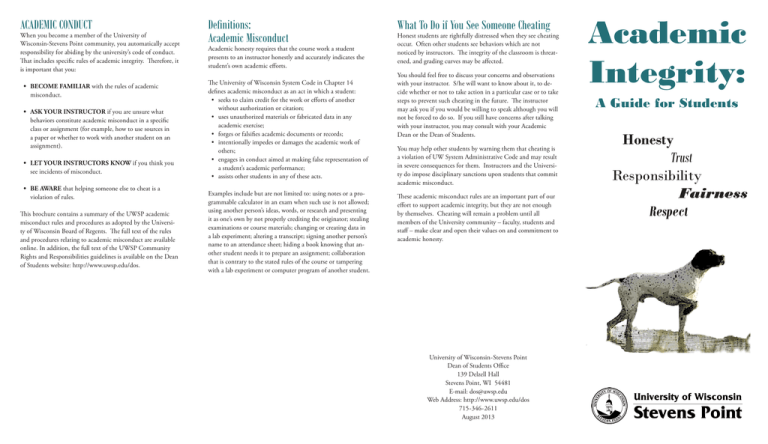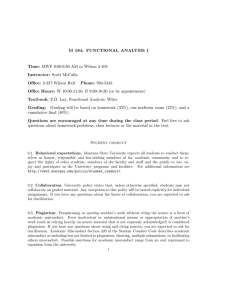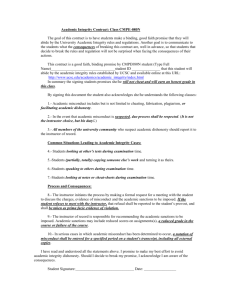Academic ACADEMIC CONDUCT Definitions: What To Do if You See Someone Cheating
advertisement

ACADEMIC CONDUCT When you become a member of the University of Wisconsin-Stevens Point community, you automatically accept responsibility for abiding by the university’s code of conduct. That includes specific rules of academic integrity. Therefore, it is important that you: • BECOME FAMILIAR with the rules of academic misconduct. • ASK YOUR INSTRUCTOR if you are unsure what behaviors constitute academic misconduct in a specific class or assignment (for example, how to use sources in a paper or whether to work with another student on an assignment). • LET YOUR INSTRUCTORS KNOW if you think you see incidents of misconduct. • BE AWARE that helping someone else to cheat is a violation of rules. This brochure contains a summary of the UWSP academic misconduct rules and procedures as adopted by the University of Wisconsin Board of Regents. The full text of the rules and procedures relating to academic misconduct are available online. In addition, the full text of the UWSP Community Rights and Responsibilities guidelines is available on the Dean of Students website: http://www.uwsp.edu/dos. Definitions: Academic Misconduct Academic honesty requires that the course work a student presents to an instructor honestly and accurately indicates the student’s own academic efforts. The University of Wisconsin System Code in Chapter 14 defines academic misconduct as an act in which a student: • seeks to claim credit for the work or efforts of another without authorization or citation; • uses unauthorized materials or fabricated data in any academic exercise; • forges or falsifies academic documents or records; • intentionally impedes or damages the academic work of others; • engages in conduct aimed at making false representation of a student’s academic performance; • assists other students in any of these acts. Examples include but are not limited to: using notes or a programmable calculator in an exam when such use is not allowed; using another person’s ideas, words, or research and presenting it as one’s own by not properly crediting the originator; stealing examinations or course materials; changing or creating data in a lab experiment; altering a transcript; signing another person’s name to an attendance sheet; hiding a book knowing that another student needs it to prepare an assignment; collaboration that is contrary to the stated rules of the course or tampering with a lab experiment or computer program of another student. What To Do if You See Someone Cheating Honest students are rightfully distressed when they see cheating occur. Often other students see behaviors which are not noticed by instructors. The integrity of the classroom is threatened, and grading curves may be affected. You should feel free to discuss your concerns and observations with your instructor. S/he will want to know about it, to decide whether or not to take action in a particular case or to take steps to prevent such cheating in the future. The instructor may ask you if you would be willing to speak although you will not be forced to do so. If you still have concerns after talking with your instructor, you may consult with your Academic Dean or the Dean of Students. You may help other students by warning them that cheating is a violation of UW System Administrative Code and may result in severe consequences for them. Instructors and the University do impose disciplinary sanctions upon students that commit academic misconduct. These academic misconduct rules are an important part of our effort to support academic integrity, but they are not enough by themselves. Cheating will remain a problem until all members of the University community – faculty, students and staff – make clear and open their values on and commitment to academic honesty. University of Wisconsin - Stevens Point Dean of Students Office 139 Delzell Hall Stevens Point, WI 54481 E-mail: dos@uwsp.edu Web Address: http://www.uwsp.edu/dos 715 - 346 - 2611 August 2013 Academic Integrity: A Guide for Students Honesty Trust Responsibility Fairness Respect Advice and Assistance If you are accused of misconduct and have questions about the process, feel free to contact the Dean of Students Office at 715-346-2611. Special Points About … Collaboration You should be aware that different instructors have different expectations about working with others. If you wish to consult with or work with another student on an assignment and you are not sure of the course rules, ask the instructor. It is each student’s responsibility to seek information about the boundaries of appropriately working with others on assignments, papers, experiments or examinations. If no rules concerning working with others have been discussed in a course, the student must assume that working with others writing a paper, completing homework, or taking an exam is not permitted. Plagiarism Plagiarism means presenting the words or ideas of others without giving credit. You should know the principles of plagiarism and the correct rules for citing sources. In general, if your paper implies that you are the originator of words or ideas, they must in fact be your own. If you use someone else’s exact words, they should be enclosed in quotation marks with the exact source listed. You may put someone else’s idea in your own words as long as you indicate whose idea it was (for example, “As Jane Smith points out …”). If you are unsure about the proper ways to give credit to sources, ask your instructor or consult the Writing Center in the Learning Resource Center, Room 018. If You Are Accused of Cheating If it appears to an instructor that you might be involved in an incident of academic misconduct – for example, cheating on an exam, plagiarizing a paper; or interfering with another student’s lab work – the instructor will invite you to meet to discuss the situation.* At this meeting the instructor will provide you with a copy of chapter 14, review the evidence, and you will have an opportunity to respond. You may bring a representative to this discussion. If the instructor is persuaded that you have not been involved, that no misconduct has occurred, or that no action is warranted, that will be the end of the matter. If the instructor concludes that academic misconduct has occurred, he or she will then decide on one or more of the following penalties. *If you are not enrolled in the class involved, the instructor will refer the matter to an investigating officer in the Dean of Students Office. Disciplinary Penalties University of Wisconsin System Chapter 14 lists penalties as a through j. The three groups of penalties have different procedures and consequences for the student. GROUP A a.) An oral reprimand b.) A written reprimand presented only to the student c.) An assignment to repeat the work to be graded on its merits. GROUP B d.) A lower or failing grade on the particular assignment or test e.) A lower grade in the course f.) A failing grade in the course g.) Removal of the student from the course in progress h.) A written reprimand to be included in the student’s disciplinary file GROUP C i.) University disciplinary probation j.) Suspension or expulsion from the University The Disciplinary Process Group A: a-c The instructor may decide on a reprimand, oral or written, and/or ask you to repeat the work affected by the misconduct. If the instructor chooses to have you repeat the work, s/he must grade it on its merits, making no deduction for the previous misconduct. The instructor is not required to make any written notice or record of his or her decision. While the instructor’s actions do constitute discipline, no permanent record is made for the penalties in this group. You do have the right to contest any penalty imposed, even these very mild ones (see hearing section), so you should keep some notes about the incident in case they are needed. Group B: d-h Penalties d-h require that the instructor prepare a written report, summarizing the reasons for the belief that misconduct has occurred, then proposing one or more appropriate sanctions. The instructor must send or give a copy of this report to you. Copies of the report will be sent to the Dean of Students Office. If you wish to appeal either the factual conclusions in the report or the proposed sanction, you must file a request for a hearing within 10 days; otherwise, the recommended sanction will be imposed. Note: If academic misconduct results in an F or a lowered final grade in a course, the grade will not be removed from a student’s transcript by dropping or withdrawing. Recommendations for Additional Sanctions When the Dean of Students Office receives an academic misconduct report from an instructor, an investigating officer will determine if additional disciplinary sanctions for the misconduct are warranted. The officer will generally recommend suspension if this is a second offense or if you are in a graduate or professional program. If the investigating officer determines that additional sanctions may be appropriate, he or she will contact you to hear your perspective. Based on the meeting with you, and after speaking with the instructor of others involved, the investigating officer will review the evidence and prepare a written report containing his or her finding and recommendations. The Right to a Hearing If you wish to contest a report of any misconduct, a hearing will be scheduled. You must request such a hearing for sanctions a through h within 10 days of the instructor’s oral or written decision, or that sanction will stand. Requests for hearings should be sent in writing to the Dean of Students Office, 139 Delzell Hall. (If you are requesting a hearing, you should continue to attend, take examinations and participate in class pending the outcome of the hearing.) Group C: i-j For sanctions i and j (probation, suspension or expulsion), a hearing will automatically be scheduled unless you waive your right to such a hearing in writing. If disciplinary probation, suspension or expulsion is recommended as a sanction, the instructor must refer the case to an investigating officer in the Dean of Students Office. You will be notified that your case has been referred. The investigating officer will meet with you to hear your statements, examine the evidence, and prepare the written report. A hearing will be scheduled for these sanctions unless you formally waive your right to such a hearing. If the proposed sanction is suspension or expulsion, you may choose to have your case heard by an Academic Misconduct Hearing Committee, which includes at least one student member, one faculty member, and a chair appointed by the Vice Chancellor for Student Affairs. At the hearing, the instructor, the investigating officer, and you, will each be asked to present evidence and make a statement. You may choose to be accompanied by a person to advise and support you. The committee or examiner will listen to the evidence and statements and then decide whether academic misconduct has occurred and what the sanction should be. The committee or examiner is not limited to the sanction recommended by the instructor. In cases in which the hearing committee or examiner prescribes the sanctions of suspension or expulsion, a further appeal to the Vise-Chancellor for academic affairs and Chancellor on the record of the hearing is possible. Finally, the Board of Regents has the right to review the record further.

